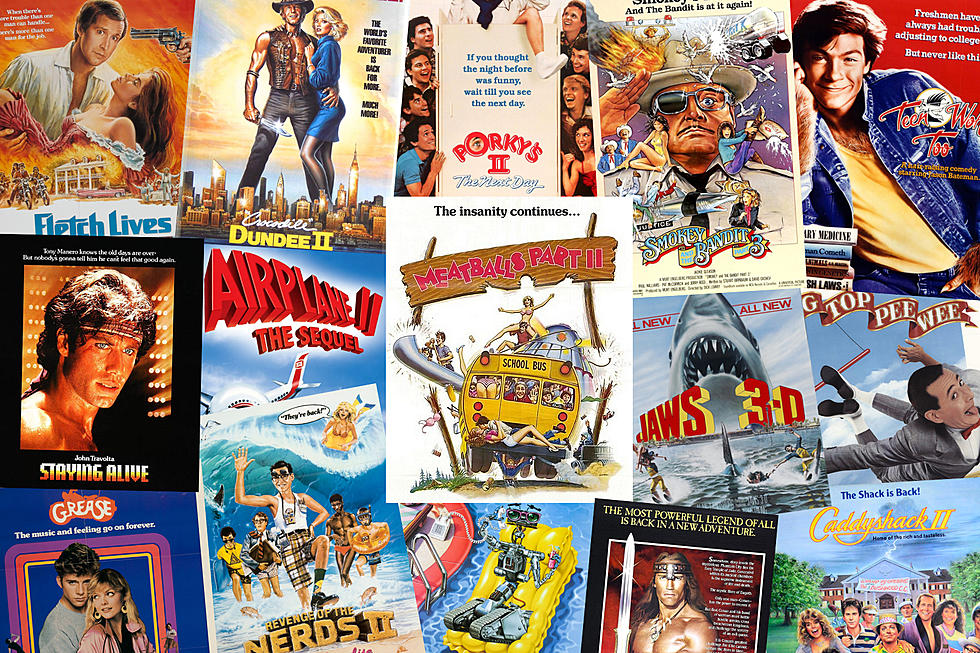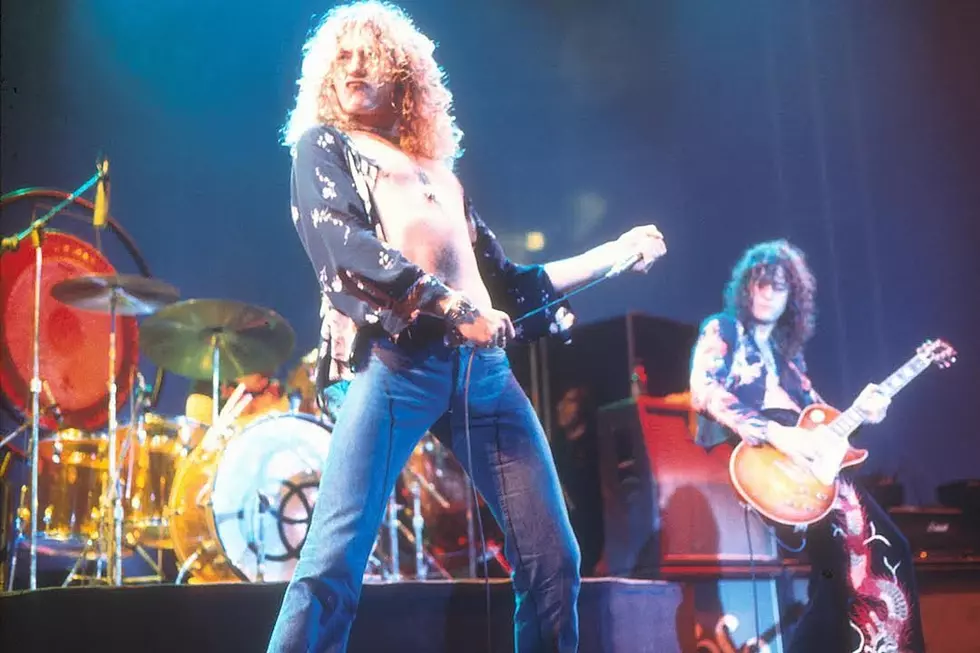
35 Years Ago: ‘All of Me’ Brings Together Three Comic Legends
All of Me brought together two comedic stars at their commercial peak -- Steve Martin and Lily Tomlin -- with legendary director Carl Reiner in 1984.
Even though it wasn't the first mainstream comedy where main characters inhabited others' bodies -- Freaky Friday was released eight years earlier -- its success helped pave the way for a new sub-genre that would flourish for the rest of the decade.
Like films that would follow, from Big to Vice Versa, All of Me features a truly goofy premise that requires considerable suspension of disbelief. Martin plays Roger Cobb, a Los Angeles-based lawyer who’s more content pursuing his side gig as a jazz musician. One day Cobb, who's dating his boss' materialistic daughter in order to get ahead in the firm, is tasked with overseeing the estate of the dying heiress Edwina Cutwater (Tomlin).
Edwina is, at first blush, grating and obnoxious; she’s as spoiled as she is childish, even in her last days. But Edwina doesn’t see her life as a tragedy, because she plans on having her consciousness transferred to Terry Hoskins (Victoria Tennant), the comely daughter of her estate’s groundskeeper, upon her death. Roger, like most people, presumes this is either a joke or a truly insane decision by a woman in her dying days. But while he’s dismissive of the idea, he soon finds it has merit.
The guru (Richard Libertini) in charge of controlling the vessel that will transfer Edwina’s consciousness inadvertently loses his grip on it as it sails out a window and knocks into Roger. The result? Edwina takes possession of the right half of Roger’s body. The rest of All of Me is dedicated to the growing relationship between Roger and Edwina inside of one body, as it shifts from distaste to respect to romantic love.
As ridiculous as that sounds, All of Me works phenomenally well, showcasing Martin’s physical-comedy talents as well as his capacity to pull off more dramatic work.
Watch Clip From 'All of Me'
All of Me came at a key moment for Martin. He had rocketed to fame in the late ‘70s with his off-kilter brand of stand-up comedy, often showcased on TV shows like Saturday Night Live. But his film career hit a snag after the initial success of The Jerk. He followed that 1979 movie with the darker, more disturbing 1981 musical drama Pennies From Heaven, in which he played a traveling music salesman whose bleak sexual predilections eventually lead him to the hangman’s noose.
Though it reunited him with his Jerk co-star Bernadette Peters, Pennies From Heaven was a box-office flop, even raising the ire of musical legend Fred Astaire. In an Astaire biography by author Tim Satchell, the dancer was quoted as saying, “Every scene was cheap and vulgar ... it makes you cry, it’s so distasteful.” Martin’s own response in Rolling Stone was more apt to his style of humor: “I must say that the people who get the movie, in general, have been wise and intelligent; the people who don’t get it are ignorant scum.”
At the very least, Martin's shift into drama alienated audiences. And so his next two movies were a return to comedy, reuniting him with Reiner, who helmed The Jerk.
Watch Clip From 'All of Me'
Reiner made his name as a writer and performer in the '50s on Sid Caesar's Your Show of Shows. He created The Dick Van Dyke Show, where he often played Van Dyke's domineering boss, recorded a series of hit "2,000 Year Old Man" albums with longtime friend Mel Brooks and has a lengthy list of film credits as a writer, director and actor.
Martin was drawn to working with Reiner on The Jerk based on The Dick Van Dyke Show, according to Martin's memoir Born Standing Up. The success of The Jerk, which grossed $73 million at the domestic box office, led to them working on three more films.
After Pennies From Heaven, Martin collaborated with Reiner on two less-financially successful films, each a pastiche of sorts of other genres. Dead Men Don’t Wear Plaid, from 1982, was a riff on film noir, as Martin played a hard-boiled detective who interacted with characters from earlier films. Archival footage put him in the same scenes with legendary actors like Kirk Douglas, James Cagney and Joan Crawford. The following year, Martin starred in Reiner’s comedy and sci-fi hybrid The Man With Two Brains. But it was All of Me, their fourth and final collaboration, that proved to be a return to creative form.
In that same span of time, Tomlin had chosen more sparingly. Two of her biggest cinematic successes came early and found her as part of a larger ensemble: the sprawling Robert Altman drama Nashville from 1975, for which she earned an Academy Award nomination for Best Supporting Actress, and the raucous gender-politics comedy Nine to Five from 1980, where she costarred with Dolly Parton and Jane Fonda.
Watch Clip From 'All of Me'
Martin and Tomlin don’t share a ton of screen time together in All of Me, though Roger often has internal conversations with her disembodied voice. After their first acrimonious scene that ends with Roger leaving Edwina on her deathbed, the only other times we see their faces interact, with the exception of a dance number over the end credits, is when Roger looks into a mirror.
Once they're forced to live in the same body and work together to get Edwina out of Roger's body, their antipathy wears off and, in true rom-com fashion, they see how life hasn't turned out the way either of them has expected, and eventually they fall in love. Meanwhile, the blonde daughter of the groundskeeper, played by Martin’s real-life future wife Tennant, is gorgeous but nefarious, willing to do anything to inherit Edwina's fortune. She's only tempered when Edwina is finally transferred into her body, and the real woman’s personality is shifted into that of a horse.
Part of the joy of All of Me is in watching Martin throw his body around and sometimes act like a woman when Edwina is controlling him. But Tomlin is every bit his equal. Yes, she is a spoiled rich woman, but she's also smart and tough, and Tomlin plays that angle, as well as Edwina's vulnerable side, with aplomb. And special mention must be given to Libertini, who, just as he did in The In-Laws, steals every scene he's in.
Some of the scenes, like when Edwina has to reach into Roger's pants to help him go to the bathroom, may not play as well today. But the actors manage to pull it off deftly, without being unnecessarily crude or inflammatory. It helps that Reiner adds a tasteful touch; even the movie's lone sexual encounter, where Roger and Terry attempt to make love but the Edwina side takes offense and spanks Terry, who enjoys it, is played more for laughs.
But the body-switch comedy, as much as it feels like a forebear of wild-and-crazy high-concept movies like Big, as well as Jim Carrey’s Liar Liar, had an unexpectedly tender side. As Martin said in the authorized biography Steve Martin: The Magic Years, “My mature film career starts with All of Me.”
Watch Clip From 'All of Me'
What worked for Martin was that All of Me balanced the two sides of his talent. For those who just wanted to see the stand-up comedian who put an arrow through his head for laughs, All of Me had such humor in spades. From the first moment when Roger forcibly realizes he’s no longer fully in control of his own movements, staggering helplessly down a city street and trying not to draw the attention of a baffled policeman, Martin let loose with a physically limber performance unlike any other he’s pulled off since. But there’s a decent amount of emotion and melodrama within All of Me. Unlike even Pennies From Heaven, which seemed to be designed to deliberately exploit his comic persona for darker aims, All of Me wanted to have it both ways for Martin.
From the comic side, people could latch onto the physical humor. As author Morris Walker noted in The Magic Years, “It was as if you didn’t need to know that Lily Tomlin’s character had invaded Steve’s body and he was being torn apart between his own mind’s ideas and her invading presence.” Critics such as Janet Maslin in The New York Times noted that “some things simply have to be seen to be believed, and the sensational teamwork of Steve Martin and Lily Tomlin ... is one of them.” Maslin went on to call the film the best American comedy since Tootsie, itself a high-wire act. Audiences flocked to All of Me, making it the No. 1 film at the box office for two weeks in a row, dethroning the massive summer hit Ghostbusters, which had spent 10 of its first 15 weeks of release at the top spot.
All of Me went on to net both Tomlin and Martin Golden Globe nominations for their work; Martin won the award for Best Actor from two different critics’ groups, the National Society of Film Critics and the New York Film Critics Circle. The film’s moderate success marked the last time Martin and Reiner collaborated, though Martin and Tomlin reunited briefly in the 2009 movie The Pink Panther 2, where he played the clumsy Inspector Clouseau.
What All of Me represented was the beginning of a fruitful career for Martin. He’d tried before to shift to darker material, but it was only by striking a balance between comedy and drama that he hit a higher gear of movie stardom.
25 '80s Movies Sequels That Shouldn't Have Been Made
More From Ultimate Classic Rock









